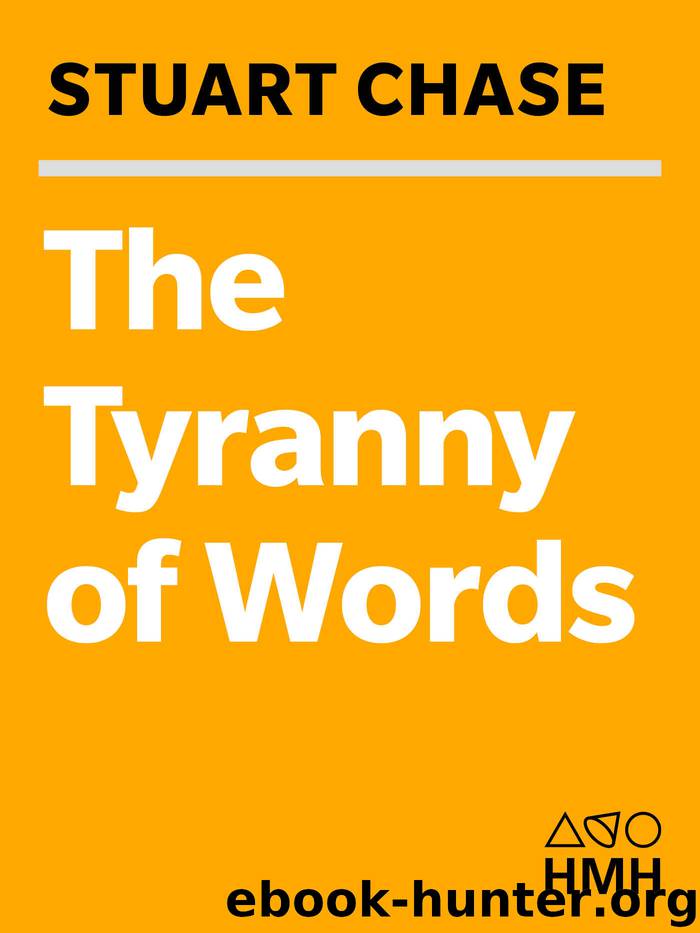Tyranny of Words by Stuart Chase

Author:Stuart Chase
Language: eng
Format: mobi
Publisher: Houghton Mifflin Harcourt
Published: 2015-04-06T14:00:00+00:00
Chapter XII
PROMENADE WITH THE PHILOSOPHERS
IT is reported that a brilliant Englishwoman, Lady Welby, once offered a prize of £1,000 to any philosopher submitting documentary evidence that he (1) knows what he means, (2) knows what anyone else means, (3) knows what anything means, (4) means what everyone else means, (5) can express what he means. . . . Philosophers, like artists, are notoriously an impecunious brotherhood, but at last accounts the prize had not been claimed.
I have a grievance against philosophers which has perhaps unduly embittered these pages. Their works have caused me many hours of conscientious toil in years past, and I resent both the conscientiousness and the wasted hours. In this chapter I propose to move the warfare from the skirmish line to pitched battle. But I owe the philosophers an honorable salute before the foils are crossed. Their sincere desire to advance knowledge cannot be questioned. Aristotle was obviously afire with this aim. Many have sacrificed honors, preferment, financial competence, home, and health in the quest. Their intellectual capacity cannot be questioned, for among their numbers are listed the mental giants of the ages. Most of them have been distinguished for toleration, fairness, and human decency, except when disputing technical points with their brethren. Strictly speaking, I have no quarrel with Socrates1 or Socrates2—rather with the philosophic method. I like to agree and get on with the matter in hand. The scientific method encourages this, while in philosophy one school after another arises on the ashes of the last, to be consumed in its turn.
William James was once asked to define philosophy and he replied, “Just words, words, words!” The philosopher is aware of the potency of his mind. He goes to it for knowledge. He believes that if he can only think energetically enough, the road will be opened. His processes are thus from reference to symbol and back to reference again, on the left side of the Ogden and Richards triangle: word, thought, word. Little of importance has yet been discovered by this method. To advance knowledge on which sane men can agree, the process must be from referent to reference to symbol, constantly checking with the world outside. To say that philosophers avoid facts is not true. But they are not governed by the facts; they are not humble before the facts; facts are not central in their concepts, but come in on tiptoe through the side door. As I see it, there are three main counts against the philosophic method.
First, the waste of time on unanswerable or meaningless questions—“being,” “becoming,” “the one,” “the superman,” the nice distinctions between “Humanism,” “Realism,” and “Materialism.”
Second, the application of philosophical deductions to the real world, with the result of distorting knowledge of that world. Trying to make the world behave as the words behave.
Third, arousing public opinion—usually unintentionally—to violent action when the facts warrant no such action. Witness Nietzsche as used by the Germans in 1914, and Spengler as used by the Nazis today.
The ancients. The Greek philosophers sought knowledge primarily with their heads and disdained to use their hands.
Download
This site does not store any files on its server. We only index and link to content provided by other sites. Please contact the content providers to delete copyright contents if any and email us, we'll remove relevant links or contents immediately.
The Art of Thinking Clearly by Rolf Dobelli(10458)
Mindhunter: Inside the FBI's Elite Serial Crime Unit by John E. Douglas & Mark Olshaker(9325)
Change Your Questions, Change Your Life by Marilee Adams(7762)
Nudge - Improving Decisions about Health, Wealth, and Happiness by Thaler Sunstein(7694)
Mastermind: How to Think Like Sherlock Holmes by Maria Konnikova(7325)
The Power of Now: A Guide to Spiritual Enlightenment by Eckhart Tolle(5761)
Men In Love by Nancy Friday(5234)
Altered Sensations by David Pantalony(5094)
Factfulness: Ten Reasons We're Wrong About the World – and Why Things Are Better Than You Think by Hans Rosling(4737)
The Confidence Code by Katty Kay(4252)
Thinking in Bets by Annie Duke(4218)
Man and His Symbols by Carl Gustav Jung(4131)
The Worm at the Core by Sheldon Solomon(3486)
Why Buddhism is True by Robert Wright(3447)
Liar's Poker by Michael Lewis(3442)
Three Women by Lisa Taddeo(3426)
The Inner Life of Animals by Peter Wohlleben(3313)
Descartes' Error by Antonio Damasio(3272)
How Music Works by David Byrne(3262)
